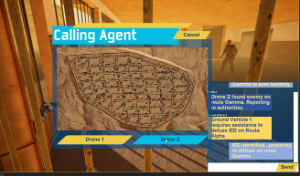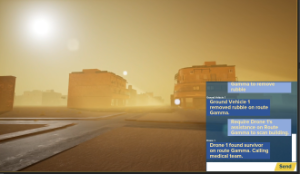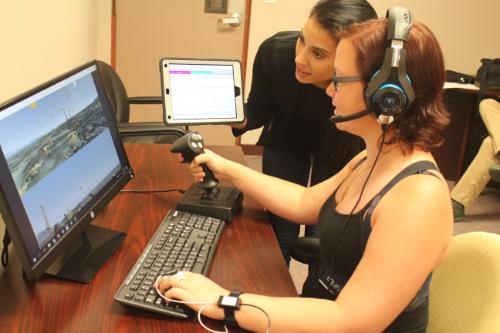Advancing Aeronautics Knowledge
The College of Aeronautics advances knowledge and provides unique, transformative learning experiences for students through solution-oriented research and key collaborative partnerships.
Adaptive Training
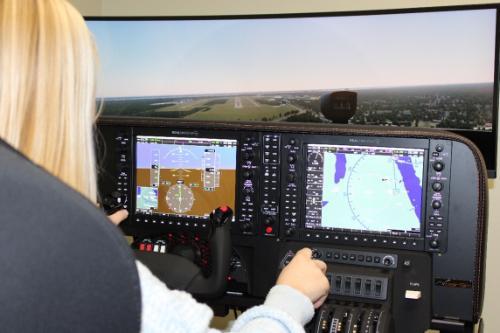 The ATLAS Lab has been funded through the Naval Air Warfare Center to examine techniques for assessing pilot expertise and adapting pilot training to accelerate learning. Adaptive training to a pilot's current skill level can keep pilots in the Zone of Proximal Development, an area of optimal learning wherein learners are adequately challenged yet not overwhelmed. This research includes identifying cognitive, behavioral, and physiological indicators that can be captured in simulation-based training and used to pinpoint pilot expertise levels in order to adapt training. This work also included a series of simulation-based experiments in which flight training difficulty was adapted based on performance or performance and mental effort, and compared to a non-adaptive condition in which difficulty was increased incrementally. Results indicated that adapting difficulty based on both performance and mental effort moderated mental effort, leading to greater training performance improvements.
The ATLAS Lab has been funded through the Naval Air Warfare Center to examine techniques for assessing pilot expertise and adapting pilot training to accelerate learning. Adaptive training to a pilot's current skill level can keep pilots in the Zone of Proximal Development, an area of optimal learning wherein learners are adequately challenged yet not overwhelmed. This research includes identifying cognitive, behavioral, and physiological indicators that can be captured in simulation-based training and used to pinpoint pilot expertise levels in order to adapt training. This work also included a series of simulation-based experiments in which flight training difficulty was adapted based on performance or performance and mental effort, and compared to a non-adaptive condition in which difficulty was increased incrementally. Results indicated that adapting difficulty based on both performance and mental effort moderated mental effort, leading to greater training performance improvements.
Advanced/Urband Air Mobility (AAM/UAM)
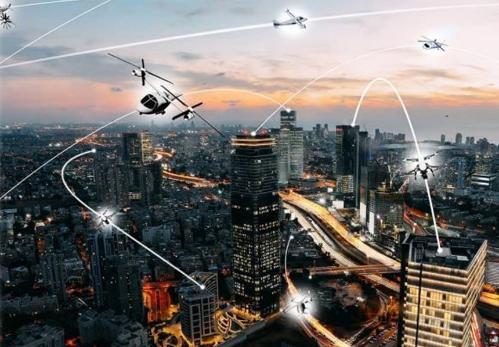 The College of Aeronautic’s ATLAS Lab,in collaboration with the College of Engineering and Science's ASSIST Lab, are leading a NASA University Leadership Initiative, TRANSCEND, Trustworthy Resilient Autonomous Agents for Safe City transportation in the Evolving New Decade, a multidisciplinary research program including team members from the University of Florida, Penn State, Stanford, the University of Alabama, and North Carolina Agricultural and Technical State University, and industry partners Collins Aerospace and ReslienX. This research and development effort is designing and evaluating methods and tools to ensure that machine-learning-enabled, autonomous systems being developed to operate in, and monitor the safety of, the national airspace system are trustworthy, believed, and relied upon. This 3-year effort includes experimentation evaluating human interactions with these systems and identification of how to design the systems such that operators understand what the autonomy is doing and why, when and when not to trust the autonomy, and methods for ensuring operator trust is appropriately calibrated.
The College of Aeronautic’s ATLAS Lab,in collaboration with the College of Engineering and Science's ASSIST Lab, are leading a NASA University Leadership Initiative, TRANSCEND, Trustworthy Resilient Autonomous Agents for Safe City transportation in the Evolving New Decade, a multidisciplinary research program including team members from the University of Florida, Penn State, Stanford, the University of Alabama, and North Carolina Agricultural and Technical State University, and industry partners Collins Aerospace and ReslienX. This research and development effort is designing and evaluating methods and tools to ensure that machine-learning-enabled, autonomous systems being developed to operate in, and monitor the safety of, the national airspace system are trustworthy, believed, and relied upon. This 3-year effort includes experimentation evaluating human interactions with these systems and identification of how to design the systems such that operators understand what the autonomy is doing and why, when and when not to trust the autonomy, and methods for ensuring operator trust is appropriately calibrated.
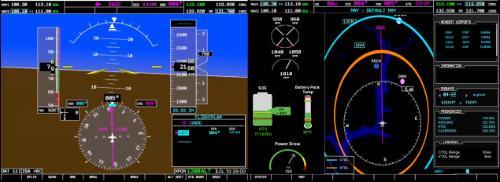 The evolving Advanced Air Mobility (AAM)/Urban Air Mobility (UAM) industry involves novel, highly automated, electric Vertical Take-Off and Landing (eVTOL) aircraft, many of which will transition from being manned to completely autonomous. Managing electrical power is different than managing fuel during flight and consideration must be given to what battery information to present to pilots and how to present this information to effectively support pilot decision making. The ATLAS Lab is conducting research to examine the effectiveness of various electric battery information display methods, including an experimental study in which various display designs were empirically evaluated regarding their impact on pilot situation awareness, workload and decision making.
The evolving Advanced Air Mobility (AAM)/Urban Air Mobility (UAM) industry involves novel, highly automated, electric Vertical Take-Off and Landing (eVTOL) aircraft, many of which will transition from being manned to completely autonomous. Managing electrical power is different than managing fuel during flight and consideration must be given to what battery information to present to pilots and how to present this information to effectively support pilot decision making. The ATLAS Lab is conducting research to examine the effectiveness of various electric battery information display methods, including an experimental study in which various display designs were empirically evaluated regarding their impact on pilot situation awareness, workload and decision making.
Image Source: https://www.nasa.gov/feature/ames/nasa-and-uber-test-system-for-future-urban-air-transport
AAM Human Factors and Safety Operational Challenges
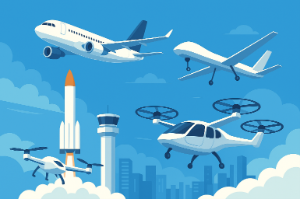 The HF ASSIST Lab and UAS Lab are working on a study to investigate the evolving AAM human factors and safety operational challenges that exist within the commercial aviation community. Stakeholders within this community are being interviewed to identify human factors and safety operational challenges from a commercial aviation perspective.
The HF ASSIST Lab and UAS Lab are working on a study to investigate the evolving AAM human factors and safety operational challenges that exist within the commercial aviation community. Stakeholders within this community are being interviewed to identify human factors and safety operational challenges from a commercial aviation perspective.
Airport Green Behavior: Intention and Action
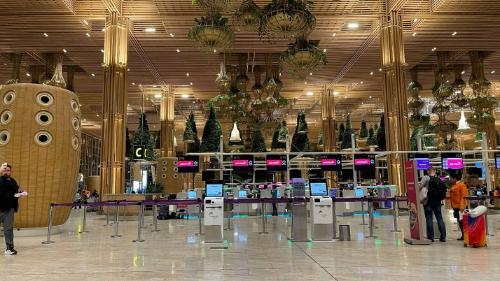 The HF ASSIST Lab is surveying the area of green behavior by airport personnel in comparing their intention and actual behavior. The study examines the influence of intrinsic motivation, subjective norm, social influence, and extrinsic rewards factors moderated by age, gender, occupation, residence, and family status on airport employees' green behavioral intention and actual green behavior. Green behavior addresses the airport community's needs for economic viability, operational excellence, natural resource conservation, preservation, and social responsibility (EONS).
The HF ASSIST Lab is surveying the area of green behavior by airport personnel in comparing their intention and actual behavior. The study examines the influence of intrinsic motivation, subjective norm, social influence, and extrinsic rewards factors moderated by age, gender, occupation, residence, and family status on airport employees' green behavioral intention and actual green behavior. Green behavior addresses the airport community's needs for economic viability, operational excellence, natural resource conservation, preservation, and social responsibility (EONS).
Image Source: https://www.nasa.gov/feature/ames/nasa-and-uber-test-system-for-future-urban-air-transport
Competency-Based Training and Assessment (CBTA)
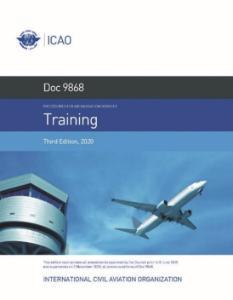 The HF ASSIST Lab is conducting a qualitative study to explore the experiences and insights of aviation instructors who have transitioned from a conventional (task and time-based) training system to a competency-based training and assessment (CBTA) system. The research intends to contribute to a deeper understanding of CBTA in practice by gathering insights from the practitioners tasked with using the CBTA protocol.
The HF ASSIST Lab is conducting a qualitative study to explore the experiences and insights of aviation instructors who have transitioned from a conventional (task and time-based) training system to a competency-based training and assessment (CBTA) system. The research intends to contribute to a deeper understanding of CBTA in practice by gathering insights from the practitioners tasked with using the CBTA protocol.
Electric Aircraft Battery Performance
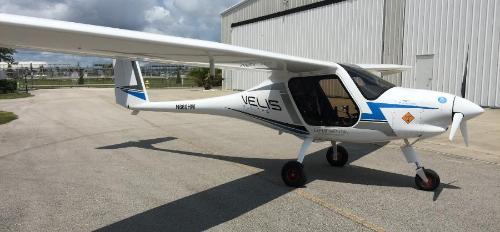 With the emergence of electric-battery-powered aircraft, it is critical to understand the performance differences between these aircraft and traditional combustion-engine-powered aircraft to ensure that pilots maintain safe flight. Under a grant funded by the FAA, COA's Sustainability, Safety, & Operations Aviation Research (SOAR), in collaboration with Florida Tech's College of Engineering and Science, studied aircraft performance, such as max power available, to examine the impact of state of charge and battery health.
With the emergence of electric-battery-powered aircraft, it is critical to understand the performance differences between these aircraft and traditional combustion-engine-powered aircraft to ensure that pilots maintain safe flight. Under a grant funded by the FAA, COA's Sustainability, Safety, & Operations Aviation Research (SOAR), in collaboration with Florida Tech's College of Engineering and Science, studied aircraft performance, such as max power available, to examine the impact of state of charge and battery health.
Human Autonomy Teaming
With the growing application of Artificial Intelligence (AI) and Autonomous Agents in defense, aviation and beyond, there is a need to understand how humans can effectively collaborate with this technology.
Under a grant funded by the Air Force Office of Scientific Research (AFOSR), COA’s ATLAS Lab is studying human interaction in multi-agent teams, such as how trust and distrust in an agent propagates through a team when an agent performs an action that violates humans' trust, and how to effectively repair this trust to facilitate effective human agent team (HATs).
This effort includes collaboration with the Air Force Research Lab’s (AFRL) Gaming Research Integration for Learning Laboratory (GRILL) who support simulation testbed development.
Human Factors in UAS BVLOS Operations
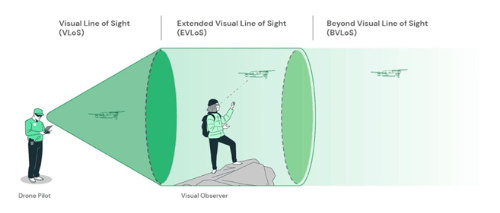 Dr. Vivek Sharma and Dr. Deborah Carstens, Director of HF ASSIST Lab are currently working on a study to investigate how visual degradation (fog, haze, glare) and display clutter impact UAS remote pilots' stress, workload, situation awareness, and decision-making during BLVOS operations. Since the FAA projects almost 3 million UAS by 2028, pilots will increasingly operate in high-risk situations such as search and rescue, package delivery, and infrastructure inspection where adverse visibility conditions tend to compromise safety. Using a high-fidelity UAS simulator (SIMNET), the research will integrate physiological (ECG, HRV, GSR) and subjective/objective measures such as NASA-TLX, STAI, SART, SAGAT to identify human performance limits and resilience techniques. The findings will provide evidence-based recommendations for safer interface design, training, and operational practice, all of which support the FAA's mission of safe UAS integration into the National Airspace System.
Dr. Vivek Sharma and Dr. Deborah Carstens, Director of HF ASSIST Lab are currently working on a study to investigate how visual degradation (fog, haze, glare) and display clutter impact UAS remote pilots' stress, workload, situation awareness, and decision-making during BLVOS operations. Since the FAA projects almost 3 million UAS by 2028, pilots will increasingly operate in high-risk situations such as search and rescue, package delivery, and infrastructure inspection where adverse visibility conditions tend to compromise safety. Using a high-fidelity UAS simulator (SIMNET), the research will integrate physiological (ECG, HRV, GSR) and subjective/objective measures such as NASA-TLX, STAI, SART, SAGAT to identify human performance limits and resilience techniques. The findings will provide evidence-based recommendations for safer interface design, training, and operational practice, all of which support the FAA's mission of safe UAS integration into the National Airspace System.
Image Source: https://www.flyeye.io/drone-acronym-bvlos/
Physiological Sensor Technology
College of Aeronautics faculty and students are utilizing advanced physiological sensor technology to assess unobservable aspects of human performance such as pilot/operator monitoring skills, workload, stress, and engagement. Measures such as eye tracking, electrodermal activity and cardiovascular activity provide insight into cognitive processes and an extra layer of diagnosticity in our human performance research.
Speech Recognition Interface for Submitting Pilot Reports (PIREPs)
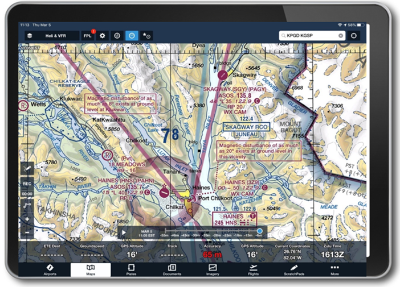
The HF ASSIST Lab team has been funded through the FAA PEGASAS Center of Excellence, conducting studies evaluating opportunities for "speech recognition" or "hands-minimized" Pilot Report (PIREP) generation support. This research included development of a lexicon of PIREP-specific terminology, experimental evaluation of a speech recognition PIREP submittal tool with GA pilots and actual PIREP lexicons, and development and assessment of a prototype PIREP submission tool for pilots that mitigates PIREP submission errors.
Machine Learning as Hazard Identification Tool
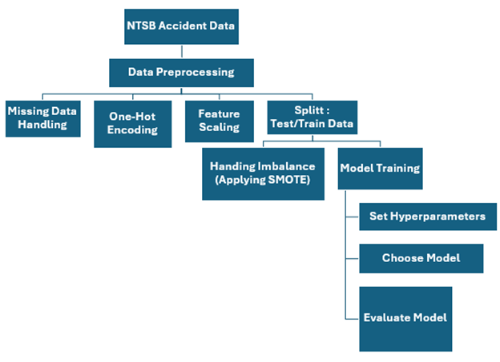 Dr. Vivek Sharma and Dr. Brooke Wheeler are working on a study that focuses on Hazard Identification in SMS using ML-based Supervised Models. This study applies NTSB accident and incident data (2014-2024) in creating predictive models of aviation hazards. By applying supervised algorithms such as Random Forest, XGBoost, SVM, and Naïve Bayes to variables like occurrence, injury type, and event type, this study will identify strong predictors of risk. The findings will provide data-informed solutions to guide SMS practitioners towards transforming from reactive to proactive to predictive safety management, in alignment with ICAO's global safety vision.
Dr. Vivek Sharma and Dr. Brooke Wheeler are working on a study that focuses on Hazard Identification in SMS using ML-based Supervised Models. This study applies NTSB accident and incident data (2014-2024) in creating predictive models of aviation hazards. By applying supervised algorithms such as Random Forest, XGBoost, SVM, and Naïve Bayes to variables like occurrence, injury type, and event type, this study will identify strong predictors of risk. The findings will provide data-informed solutions to guide SMS practitioners towards transforming from reactive to proactive to predictive safety management, in alignment with ICAO's global safety vision.
Weather Representativeness & Uncertainty for Low Altitude Operations
The College of Aeronautics research team that is funded through the FAA PEGASAS Center of Excellence is conducting research focused on weather information representativeness and uncertainty in challenging and dynamic low altitude weather conditions.
The research effort is assessing and recommending tools to improve pilot understanding of information representativeness and uncertainty associated with local terrain, low altitude air dynamics, or other considerations not well captured by weather stations at Automated Surface Observing Systems (ASOS) and Automated Weather Observing System (AWOS) sites.
Additionally, this work includes utilizing machine learning to extract cloud types and/or obscurations from weather camera images and leverage these observations as both advisory information as well as information to help assess representativeness of weather conditions where surface weather systems may not be available.
Research Collaboration with Industry & Commercial Partners
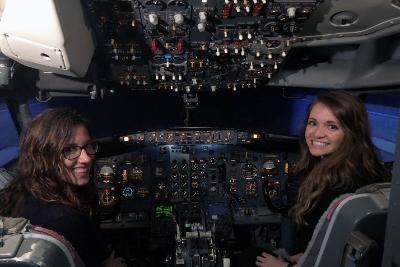
College of Aeronautics faculty and a graduate students teamed with a major US air carrier to perform a usability analysis of an EFB application currently used by the air carrier.
The Florida Tech team provided redesign recommendations to the air carrier’s EFB team that were aimed to increase usability of the EFB and streamline pilot performance.
If implemented, the redesign recommendations are predicted to decrease time to complete one of the key preflight preparation tasks by almost 50%.
-300x200.jpg)
College of Aeronautics ATLAS Lab has a collaborative partnership with the United States Air Force's Gaming Research Integration for Learning Laboratory (GRILL).
Through this partnership students have worked hand in hand with software developers to design and develop a range of different virtual environment testbeds for research and training. The partnership also facilitates internships and fellowship opportunities.
Unmanned Aircraft Systems
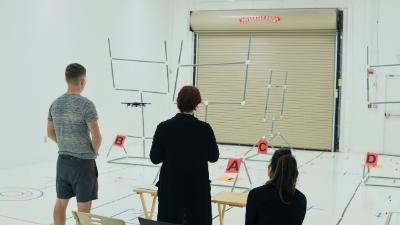
Florida Tech's College of Aeronautics was funded by the Air Force Research Lab to identify and empirically evaluate measures and interventions to increase learner engagement during UAS training. This research has developed and empirically evaluated an applied model of learner engagement. The research effort also identified physiological measures to quantify learner engagement and interventions to increase engagement during training.

 Give to Florida Tech
Give to Florida Tech 
